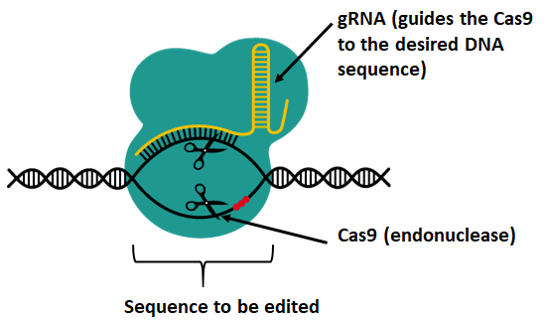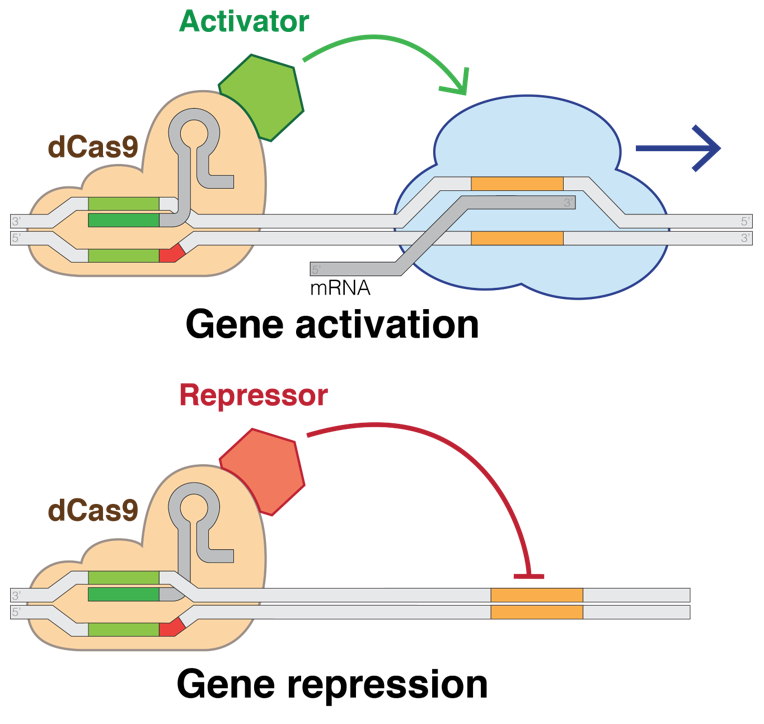Recently, during my studies at the university I came across a quite interesting paper about CRISPR/Cas9. Although this paper was published a few years ago I felt like not many people knew about it. When I first read it, I was very excited and even included it in one of my presentations. Now I want to share this with you!
Many of you might be aware of the revolutionizing CRISPR/Cas9 system which was initially identified to be an adaptive immune system in bacteria and archaea. In 2012, Charpentier and Doudna published their paper in which they demostrated that this system could be used for editing genes in a quite simple manner. At that time, many people thought that they would win the next nobel prize in physiology/medicine. However, they are still waiting for this to happen. In my opinion, their discovery definitely deserves it.
Charpentier and Doudna used the endonuclease, Cas9 (basically a molecular scissor) that can cut the DNA at a specific site. This enzyme is guided to a certain DNA sequence by a gRNA (guide RNA). Once this scissor cuts the DNA, it is possible to insert a new DNA sequence, thereby editing the gene of interest.
In the past years, much research was conducted, demonstrating the great impact this technique had and still has. Although this system could potentially be used to eradicate genetic diseases, it comes with great risks. I will not go into detail here but I would love to hear your thoughts about this.
When the CRISPR/Cas9 technique was initially demonstrated, everybody was excited as it gave everyone an easy tool for editing genetic sequences. Currently, even DIY CRISPR kits are being developed and sold, enabling every person to do this at home, which I believe can be quite dangerous.
Before the CRISPR "revolution", zinc finger nucleases and TALENS were used to edit genes, which were however quite time-consuming and difficult. Another method, which is still commonly used, is RNAi (RNA interference). This method relies on short RNA molecules that can target the mRNA (the transcript of a DNA sequence) of a gene of interest and inhibit its translation.
What I actually wanted to talk about is CRISPRi/a. As you mighty have correctly assumed "i" stands for interference and "a" for activation. In 2013, so just one year after the release of the CRISPR/Cas9 system, a paper was published, demonstrating CRISPR/Cas9 to be repurposed for gene regulation instead of gene editing (Qi et al., 2013).
For this, they used a catalytically dead Cas9 (dCas9), meaning it has lost its ability to cut the DNA. However, it can still be guided to a specific DNA sequence by a gRNA (guide RNA) which is also used in the normal CRISPR/Cas9 system.
Qi and colleagues showed that this dCas9 can interfere with the gene expression and inhibit it, albeit only to a certain extent. As they were not happy enough with the degree of interference they fused a repressor domain to the dCas9 which then resulted in a sufficient gene repression. Later, this was also done using an activator domain fused to the semi-functional dCas9. This CRISPRa system achieved strong expression of the gene of interest.
One clear advantage of CRISPRi/a is that it makes it possible to "control" the expression of a certain gene. In this case, genome modification is based on gene regulation instead of gene editing.
As this CRISPRi/a technique is reversible (unlike the normal CRISPR/Cas9), I belive it is a powerful tool for genome modification. What do you think about it? Do you think humans should be allowed to change their genetic composition?
PS: I described these methods in a very simplified manner so that many people would understand. If you are interested in the details, please let me know.


Hey @schay! I am a biologist too. What did you specialize in?
Really you made it very easy to understand. And yeah, go on and explain such new methods and techniques, whatever you can.... you can count me one of your reader.😄
Looking forward for your next post.
Thanks @vinamra! Great to get some feedback :) I will definitely continue.
I specialized in molecular genetics, what about you?
I have done Molecular biology and Microbiology both in my past.
But now I'm in nanotechnology......
I really miss the two years of molecular biology and enjoyed doing the microbiology though.